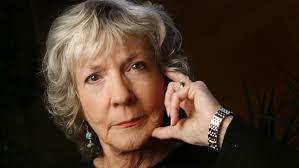
Citations de Sue Grafton (182)
Never polish the first chapter until the last chapter is written.
(Tony Hillerman, “Building Without Blueprints”)
(Tony Hillerman, “Building Without Blueprints”)
Authors who tell you about the book that “wrote itself” usually fail to mention the many hours, perhaps weeks, or even months, they spent “thinking about” the plot and planning the structure of the book that “wrote itself.”
(George C. Chesbro, “In Search of a Novel”)
(George C. Chesbro, “In Search of a Novel”)
(…) one should always bear in mind that rarely is anything of value merely written, it is rewritten, increasingly refined and polished through subsequent drafts.
(George C. Chesbro, “In Search of a Novel”)
(George C. Chesbro, “In Search of a Novel”)
Writing is dreaming; anyone can dream, but not every dreamer can cause a dream to materialize by way of words on the printed page, strings of letters that may eventually entertain, enthrall, or even terrorize countless readers.
(George C. Chesbro, “In Search of a Novel”)
(George C. Chesbro, “In Search of a Novel”)
Maybe “real” life is not so civilized, maybe “real” murders do not so frequently get their comeuppance, and maybe “real” justice is not so commonly done, but mystery readers appear to have a “real” need to believe all of that is possible in this world.
(Nancy Pickard, “The Amateur Sleuth”)
(Nancy Pickard, “The Amateur Sleuth”)
A fourth apparent disadvantage to writing an amateur sleuth novel is that you generally can’t use as much bad language, violence, sex, or gore as you could in some other types of mysteries.
And isn’t that a relief? And isn’t your mother grateful?
(Nancy Pickard, “The Amateur Sleuth”)
And isn’t that a relief? And isn’t your mother grateful?
(Nancy Pickard, “The Amateur Sleuth”)
The first question you have to ask is what kind of story you want to tell. In particular, you need to think about what kind of problem you want to solve.
(Sara Paretsky, “Writing a Series Character”)
(Sara Paretsky, “Writing a Series Character”)
As in all writing, show don’t tell. Involve all five senses. Above all, give us strong images.
(Julie Smith, “Background, Location., and Setting”)
(Julie Smith, “Background, Location., and Setting”)
(…) One of the most enjoyable aspects of professional writing is the opportunity to learn things we never had the time, or desire, to study in school.
(Faye Kellerman and Jonathan Kellerman, “Expertise and Research”)
(Faye Kellerman and Jonathan Kellerman, “Expertise and Research”)
Technical data should never interfere with the flow of the story, nor should it be so jargon-laden or esoteric that only another “expert” understand what you’re trying to say. (…) Transfer of information should sound natural, never pedantic.
(Faye Kellerman and Jonathan Kellerman, “Expertise and Research”)
(Faye Kellerman and Jonathan Kellerman, “Expertise and Research”)
The first thing to realize is that your specific lifestyle or livelihood will always dictate your work habits, and it would be a mistake to try to adopt the schedule of a novelist just because you like his or her books.
(Dick Lochte, “On Work Schedules”)
(Dick Lochte, “On Work Schedules”)
How do you hold onto ideas that seem exciting until you’re ready to work on them? Some writers say that the measure of a good idea is its ability to survive without written down.
J'ai entendu dire que si des gens se font virer c'est parce qu'ils cherchent inconsciemment à recouvrer leur liberté, mais ça m'a tout l'air d'être le genre de déclaration que l'on fait avant d'être flanqué dehors.
The one mandate that the rule of violence still carries, at least for a private investigator novel, is that there must be at least one death-by-criminal-act in the book.
The reason behind the rule of setting should be to have a place that provides a suitable backdrop for your story line and a pool of different characters for your cast.
The first rule of mystery writing can be stated simply: The plot is everything. All other aspects of the book must be slaves to the story line.
(Jeremiah Healy, “The Rules and How to Bend Them”)
(Jeremiah Healy, “The Rules and How to Bend Them”)
Your job, as a practicing mystery writer, is to lay out a believable tale of intrigue and ingenuity… always with the proviso that you play fair with the reader, who in turn will be doing his or her best to catch you at your tricks. You would do well, incidentally, to assume your reader is at least as smart as you.
The mystery is a way of examining the dark side of human nature, a means by which we can explore, vicariously, the perplexing questions of crime, guilt and innocence, violence and justice.
Force me fut d'admirer l'art avec lequel elle en venait donc au sujet, indifférente. Elle en faisait sûrement pipi dans sa culotte, espérant que j'allais lui confier la bribe d'information qui lui permettrait de les coiffer tous au poteau.
- Kinsey ! Je ne t'attendais pas aujourd'hui. Entre, entre ! Ta main... que lui est-il arrivé ?
- C'est une longue histoire ! Dans une minute, je te donne la version abrégée.
- C'est une longue histoire ! Dans une minute, je te donne la version abrégée.
Les Dernières Actualités
Voir plus
Listes avec des livres de cet auteur

Les femmes dans le polar
Cricri08
70 livres

LA CUISINE DU DIABLE
wellibus2
32 livres
Auteurs proches de Sue Grafton
Lecteurs de Sue Grafton (654)Voir plus
Quiz
Voir plus
L'alphabet du crime ! (1)
1982 : "Je m'appelle Kinsey Millhone. Trente-deux ans, deux fois divorcée, et appréciant la solitude. Je suis détective privé à Santa Teresa en Californie. Certains prétendent que ce n'est pas un métier pour une femme. Les préjugés ont la vie dure. Mais en général les clients sont plutôt contents de mes services". A comme ...
Amour
Argent
Alibi
12 questions
20 lecteurs ont répondu
Thème :
Sue GraftonCréer un quiz sur cet auteur20 lecteurs ont répondu































